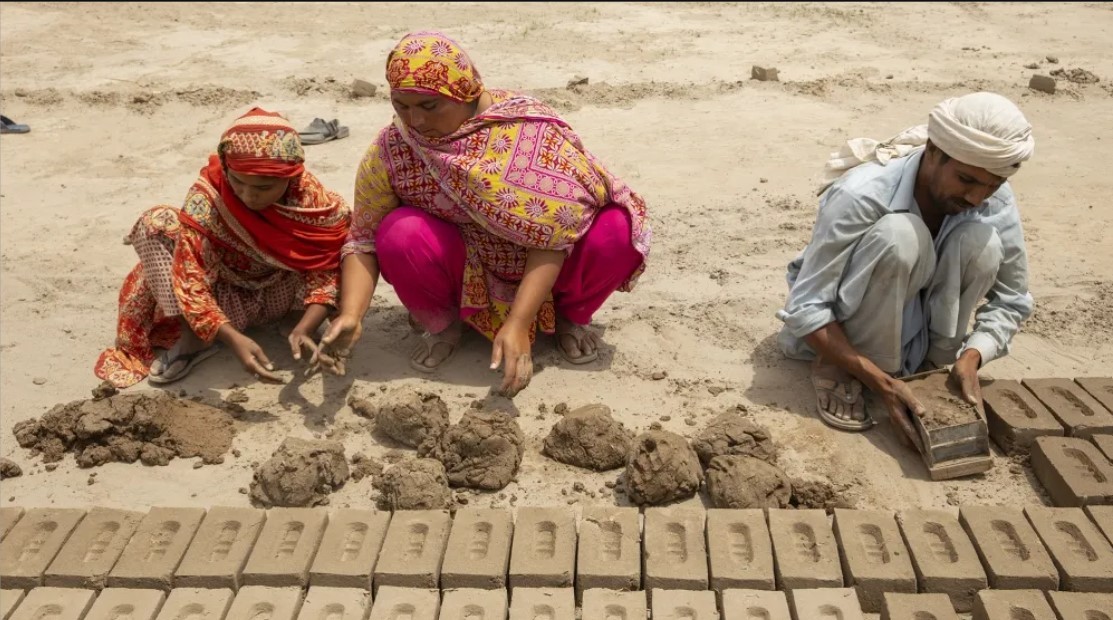
When women in Pakistan held protests on International Women’s Day on March 8 this year, they did not just seek basic rights but also demanded the elimination of bonded labour.[1] The practice of bonded labour is widespread in Pakistan and is causing huge injustice to poor, helpless people despite the legal protection against modern-day slavery.
While there is no concrete data about the actual number of bonded labourers in Pakistan, an investigative report by the Pulitzer Centre showed it to be over four million.[2] The economic, political and climate crises in recent years have only worsened the situation.
Bonded labour is a crude form of human exploitation, which is prevalent in many sectors, mainly, agriculture, brick-making and carpet-weaving sectors in Pakistan. Under ‘peshgi’ system, landlords provide labourers loans at exploitive terms such as high interest and incorrect book-keeping. So debts are transferred from generation to generation and the bonded labourers can hardly get rid of the system.
A report by the UK Department for International Development (DFID) identified extreme poverty and unequal income distribution of wealth as being responsible for the deep-rooted practice of debt bondage in Pakistan. “In most sectors, the people working in bonded labour come from families which have remained trapped in bonded labour for several generations. It is so deeply entrenched as an economic model that bonded labourers tacitly accept it as a way of life,” it reads.[3]
Bonded labourers are subjected to misery, inhuman conditions and exploitation against their will by the powerful landlords. “They control almost every aspect of the tenants’ lives. They keep them under a close watch,” said social activist Rizwan Rafiq Minhas.[4]
Women are forced to work for little or no wage while children are pledged to repay loans taken by their parents, said Lahore-based Bonded Labour Liberation Front (BLLF). “Bonded labour is a system of dehumanization that deprives workers and their families of all their rights. It’s a vicious circle of poverty, ignorance, mental and physical servitude that [persists] from generation to generation,” said Syeda Ghulam Fatima, secretary general of BLLF.[5]
Pakistan passed the Bonded Labour System (Abolition) Act in 1992 to end the practice of bonded labour. However, there has been no implementation of this Act and other related laws. Various studies showed that the government officials and judiciary have been more sympathetic to offenders rather than bonded labour.[6]
Ali Qazilbash, Chair, Department of Law and Policy at Lahore University, said “Failure of the police and the lower judiciary is a major factor in the persistence of bonded labour. At times the police is complicit in protecting the perpetrators of this crime and the judges in courts do not go beyond setting the bonded labourer at liberty.”[7]
Pakistan’s powerful military also has been blamed for protecting the landlords engaged in the practice of bonded labour. It even reversed the reforms that were undertaken earlier to rein in landlords, said Karamat Ali, executive director of the Pakistan Institute of Labour Education and Research (PILER).
“Military governments co-opt and patronized influential landlords to legitimize their own rule,” Ali said. “But the civilian governments, including the present one, are no better. They are too weak to drive any reform as they also rely on the same fuedals for political support.”[8] A US government report has already criticised the Pakistani enforcement agencies for failing to secure convictions despite the evident cases of bonded labour and having relevant laws to prevent them.[9]
Now, the effects of climate change are contributing to the problem of bonded labour. More and more labourers are getting stuck in severe debt bondage as they cannot repay high-interest loans as a result of crop losses due to extreme weather patterns. The 2022 floods pushed many Pakistanis into bonded labour while prolonged droughts have created a new generation of bonded labourers, said Shehryar Fazli, Senior policy advisor at New York-based Open Society Foundations.[10]
“If the income is insufficient, the debt is rolled over to the following harvest. Successive years of crop failure create interminable cycles of debt, which are transferred from generation to generation,” Fazli said. “Powerful landlords even detain their indebted farmers in private prisons until they repay through unpaid labour, only occasionally resulting in police action.”
END.
[1] https://www.rferl.org/a/pakistan-womens-day-march/32853998.html
[2] https://pulitzercenter.org/stories/bonded-brick-insight-brutalities-faced-brick-kiln-workers-ep-01
[3] https://assets.publishing.service.gov.uk/media/5e56a35a86650c53b6909337/DFID_Modern_Slavery_in_Pakistan_.pdf
[4] https://www.dw.com/en/life-of-slavery-the-perpetuation-of-bonded-labor-in-pakistan/a-51792298
[5] https://asia.fes.de/news/breaking-the-chains-of-bonded-labour-in-pakistan
[6] https://www.ilo.org/wcmsp5/groups/public/—ed_norm/—declaration/documents/publication/wcms_096991.pdf
[7] https://voicepk.net/2020/02/the-curse-of-bonded-labour-2/
[8] https://www.dw.com/en/life-of-slavery-the-perpetuation-of-bonded-labor-in-pakistan/a-51792298
[9] https://2009-2017.state.gov/j/tip/rls/tiprpt/countries/2014/226793.htm
[10] https://www.aljazeera.com/opinions/2023/9/1/modern-slavery-pakistans-growing-climate-change-curse






